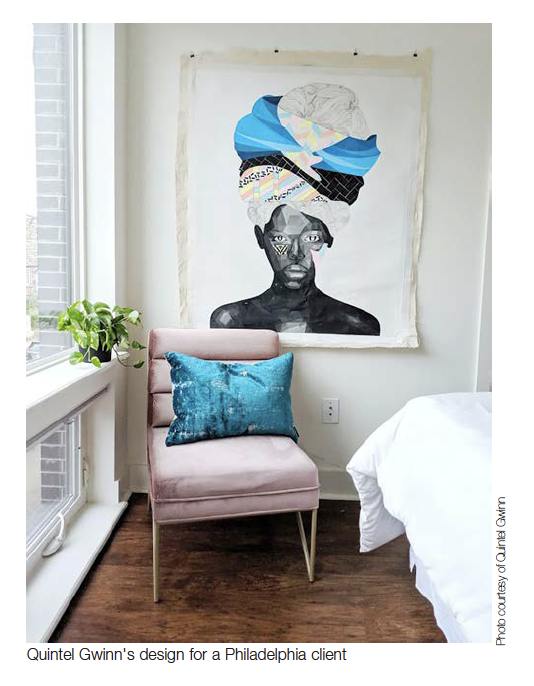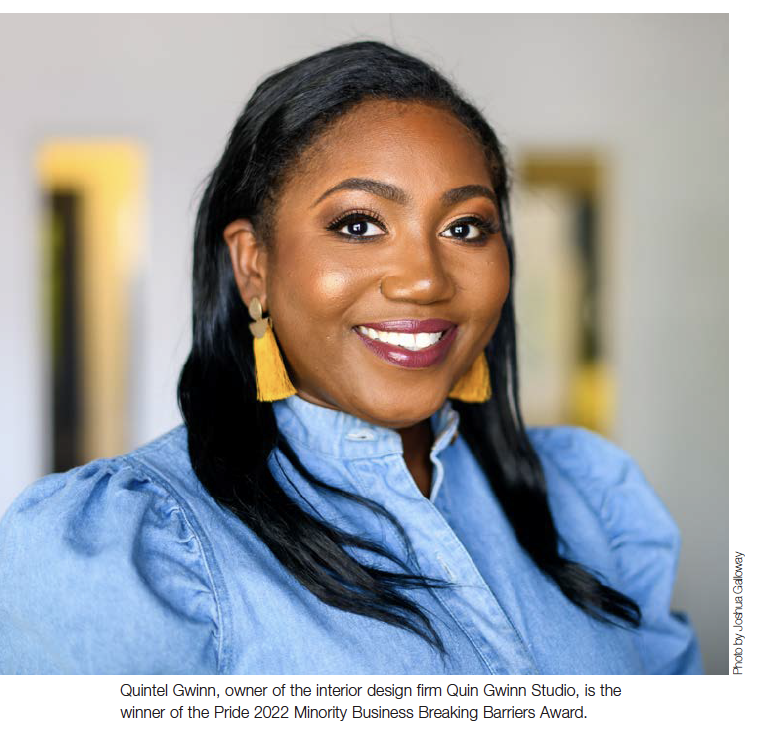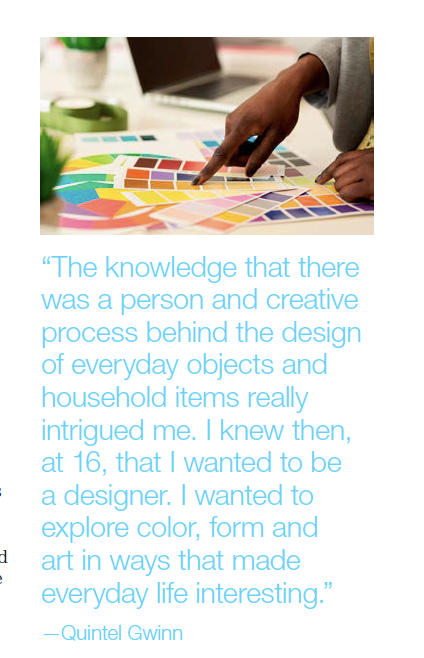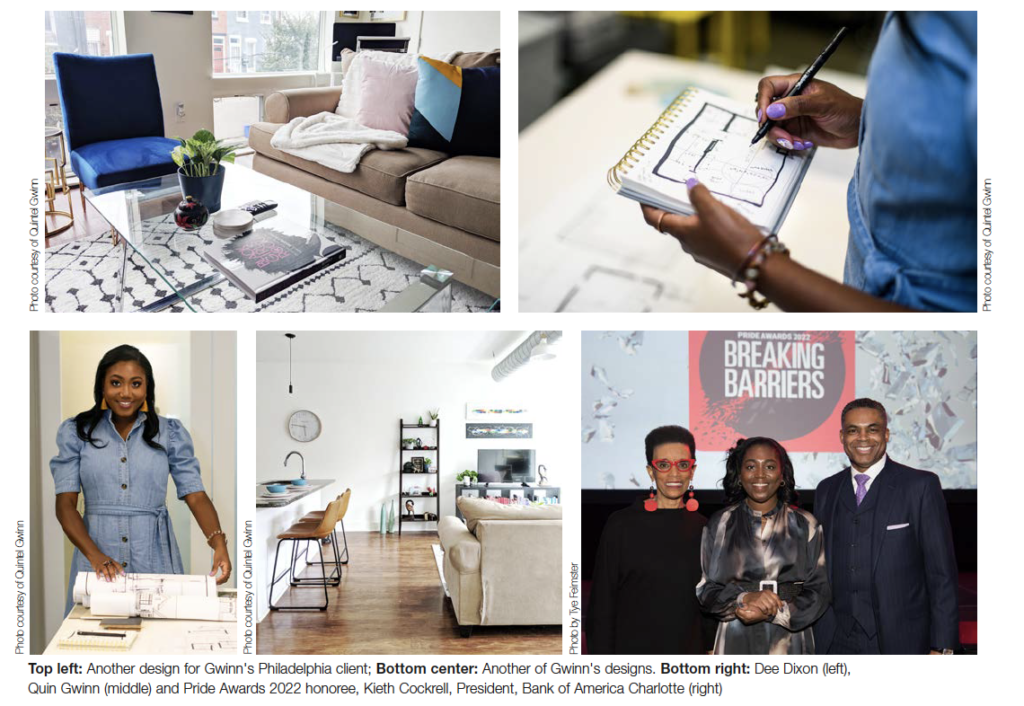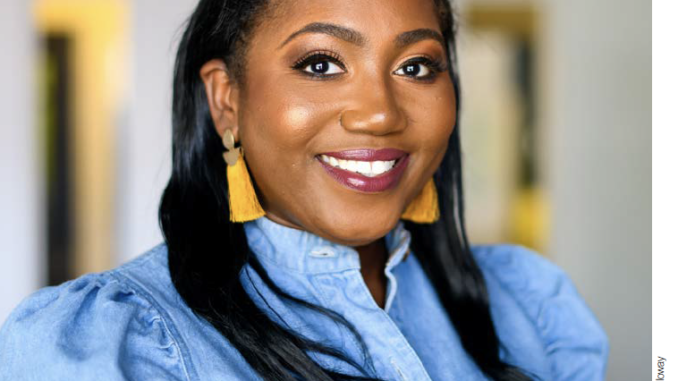
The road to becoming a business owner is often complicated. Minority entrepreneurs can face particularly onerous obstacles when trying to access the resources necessary to make business ownership more than just a good idea.
Black interior designer, Quintel Gwinn, knows all too well how rocky the road to entrepreneurship can be. After graduating from Georgia Southern University with a degree in interior design and completing an internship at an architectural firm, she landed a job with a Black architectural firm in Columbus, Ga. But when the economy took a downturn, she lost her job.
After moving to Charlotte with her family in 2010, Gwinn worked a couple of part-time jobs, earned her Master of Arts degree in Interior Architecture from Queens University of Charlotte and then created her own design firm, Quin Gwinn Studio, in 2014.
Quin the winner
Gwinn accomplished another notable achievement in February by winning the Pride 2022 Minority Business Breaking Barriers Award at this year’s Pride Magazine’s Pride Awards luncheon at The Westin Charlotte. Gwinn and several other local small business owners participated in a creative pitch contest on stage during the program. Audience members voted for the pitch they liked the most.
Although she said she’s not comfortable talking about herself, Gwinn plowed through her nervousness during the competition and presented her two-minute winning pitch.
“My concept was to perform the pitch as a live TikTok clip and hope the perks of self-promotion would liberate my nerves,” she said. “I decided to incorporate my basket of tools – paint color deck, measuring tape, fabric swatches, floor plans – as a way to illustrate the creative solutions I explore in my profession as an interior designer.”
Gwinn said she knew she needed a strong ice breaker to engage the audience. She decided to highlight how much the pandemic changed the way many people experienced being at home and the ways their personal environment impacts their daily habits. “So, I started my pitch by asking the audience to shout, in unison, which room they spent the most time taking Zoom meetings in. It made us all laugh!” she shared. “And it was a great way to instantly connect a need they might have with the service I offer.”
The approach clearly worked, though Gwinn says she was surprised and excited to win.
“I wasn’t expecting it at all. Winning gave me a good feeling and filled me with gratitude,” said Gwinn, who won a marketing reward package that includes a photo shoot and coaching — professional services that will elevate her business this year, she added.
“Being able to amplify the work I do and represent an industry in which Black designers only make up 2 percent was really important.” Having opportunities to network and build connections with potential clients during the awards event aids in her continued success as a small business owner, Gwinn said. “Relationships are key.”
Gwinn, a Georgia native, became interested in design after a high school field trip to Atlanta’s High Museum of Art where she was inspired, specifically, by the iconic modern furniture made in the 1940s and 1950s, including signature pieces by renowned architect Frank Lloyd Wright.
“This sparked my interest in architecture, furniture design and interiors,” she said. “The knowledge that there was a person and creative process behind the design of everyday objects and household items really intrigued me. I knew then, at 16, that I wanted to be a designer. I wanted to explore color, form and art in ways that made everyday life interesting. I wanted to create new experiences in places that were familiar to me and, through thoughtful design, make them more enjoyable.”
To complete her Quinn Gwinn Studio design team, Gwinn hired all Black women. “This is my attempt at putting a tiny dent in the gender gap, diversifying the profession, and exposing more young professionals and communities to the industry,” Gwinn told Charlotte Magazine in 2019.
Obstacles to Black entrepreneurship
According to the 2020 U.S. Census Bureau statistics, only 4.8 percent of interior designers are Black, 72.7 percent are white, 8.9 percent are Asian, 3.2 percent are Hispanic, 2 percent are mixed-race and less than 1 percent are American Indian. The American Society of Interior Designers (ASID) reports that less than 2% of their membership identify as Black.
Also, a 2021 report from the University of North Carolina at Charlotte Urban Institute said although small business ownership plays a large role in our economic and financial wellbeing, stark racial differences in ownership persist. Businesses and financial assets (bank accounts, mutual funds, etc.) make up only 15 and 8 percent of wealth for Latino and Black households, respectively, while these assets make up a third of overall assets for white and Asian households.
The disproportionate distribution of these assets contributes to the racial wealth gap, which means that people of color have less access to personal capital to start and maintain a business.
Looking ahead
Moving forward Gwinn said she would like to open a public location that would allow her to continue to offer interior design services working out of a studio and also incorporate a retail showroom where she can sell furnishings, housewares and decorative accessories.
“I have enjoyed curating art, textiles and decor for my private clients and would love to share that experience with a broader clientele. I want to share my love of color, pattern and modern design with more people and be a resource for home enthusiasts throughout the Southern region,” she said.
In her March 25 Instagram post @quingwinn, Quinn gives inspiring advice to hopeful entrepreneurs: “Hold the vision. Trust the process … Believe that you can do it, even when nobody else does.”

